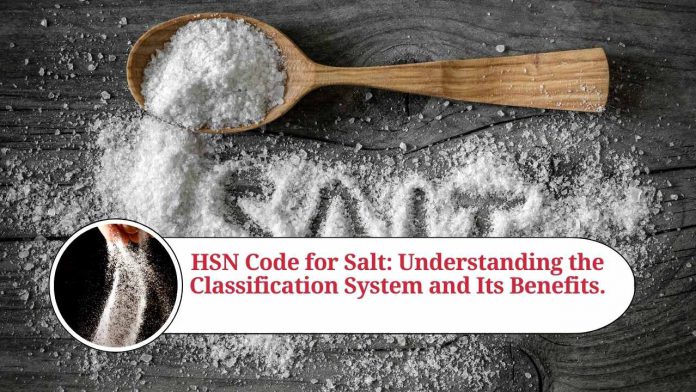Introduction
The Harmonized System of Nomenclature, also known as the HSN code, is a globally recognized system that is used to classify goods based on their nature, composition, and intended use. HSN codes are used by businesses and governments worldwide to facilitate international trade and simplify customs procedures. In this blog, we will discuss the HSN code for salt and its various aspects.
What is HSN Code?
The HSN code is a six-digit code that is used to classify goods for taxation purposes. It was developed by the World Customs Organization (WCO) and is used by over 200 countries worldwide. The first two digits of the HSN code represent the chapter, the next two digits represent the heading, and the last two digits represent the subheading.
HSN Code for Salt
The HSN code for salt is 2501. This code falls under Chapter 25 of the HSN classification, which deals with salt, sulfur, earths, and stone. The heading for Chapter 25 is “Salt; sulfur; earths and stone; plastering materials, lime, and cement.” The subheading for salt is “Salt (including table salt and denatured salt) and pure sodium chloride, whether or not in aqueous solution or containing added anti-caking or free-flowing agents; sea water.”
Classification of Salt under HSN Code
Salt is classified under HSN code 2501. This code covers all types of salt, including table salt, denatured salt, and pure sodium chloride, regardless of whether they are in aqueous solution or contain anti-caking or free-flowing agents. The code also includes sea water.
HSN Code for Salt Products
Different salt products have different HSN codes, depending on their composition and intended use. Some common salt products and their HSN codes are:
- Himalayan Pink Salt – HSN code 2501 00 10
- Epsom Salt – HSN code 2501 00 20
- Sea Salt – HSN code 2501 00 30
- Industrial Salt – HSN code 2501 00 40
- Iodized Salt – HSN code 2501 00 90
Benefits of HSN Code for Salt
The HSN code for salt has several benefits, including:
- Streamlined Customs Procedures: The use of HSN codes simplifies customs procedures, making it easier for businesses to import and export goods. By using the correct HSN code, businesses can avoid delays and reduce the risk of penalties.
- Clarity on Taxation: HSN codes provide clarity on the tax rate applicable to a particular product. This helps businesses to accurately calculate the taxes payable and avoid overpayment or underpayment of taxes.
- International Trade: The use of HSN codes for salt is essential for businesses involved in international trade. By using the appropriate HSN code, businesses can ensure compliance with international trade regulations and avoid penalties.
- Improved Data Management: HSN codes provide a standardized way of classifying goods, making it easier for businesses to manage their data. This helps businesses to track their inventory, manage their supply chain, and improve their overall efficiency.
Classification of Salt under GST In India, the HSN code for salt is used for taxation purposes under the Goods and Services Tax (GST) system. Salt is classified under HSN code 2501 and is taxed at a rate of 5%.
Conclusion
In conclusion, the HSN code for salt plays a vital role in simplifying the taxation process and facilitating international trade. By understanding the HSN code for salt and its various aspects, businesses can ensure compliance with international trade regulations and avoid penalties. The use of HSN codes also provides clarity on taxation, improves data management, and streamlines customs procedures. Therefore, it is essential for businesses to use the appropriate HSN code for salt to ensure the smooth functioning of their operations.
Read more useful content:
Frequently Asked Questions (FAQs)
What is an HSN code for salt?
An HSN code for salt is a six-digit code that is used to classify salt products for taxation purposes. It is a globally recognized system used by businesses and governments worldwide to facilitate international trade.
What is the HSN code for table salt?
The HSN code for table salt is 2501 00 10. This code falls under Chapter 25 of the HSN classification, which deals with salt, sulfur, earths, and stone.
What is the GST rate on salt?
In India, salt is taxed at a rate of 5% under the Goods and Services Tax (GST) system.
What is the HSN code for Himalayan Pink Salt?
The HSN code for Himalayan Pink Salt is 2501 00 10. This code is used to classify all types of table salt, including Himalayan Pink Salt.
What is the HSN code for Industrial Salt?
The HSN code for Industrial Salt is 2501 00 40. This code covers all types of industrial salt, including rock salt, sea salt, and brine salt.
What is the HSN code for Iodized Salt?
The HSN code for Iodized Salt is 2501 00 90. This code is used to classify all types of iodized salt products, including table salt and iodized rock salt.
What is the HSN code for Epsom Salt?
The HSN code for Epsom Salt is 2501 00 20. This code is used to classify all types of magnesium sulfate products, including Epsom Salt.
Do different types of salt products have different HSN codes?
Yes, different types of salt products have different HSN codes, depending on their composition and intended use. Some common salt products and their HSN codes are listed in the blog above.
Is the HSN code for salt the same in all countries?
No, the HSN code for salt may vary slightly in different countries depending on their specific trade regulations. However, the first six digits of the code remain the same worldwide.
How do I determine the correct HSN code for my salt product?
To determine the correct HSN code for your salt product, you should consult the HSN classification system and identify the appropriate chapter, heading, and subheading based on the composition and intended use of your product. Alternatively, you can seek the assistance of a tax professional to ensure compliance with international trade regulations.




















